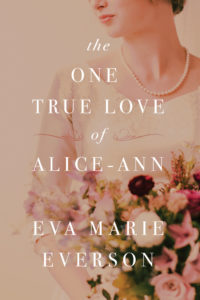The latest historical romance from Christian fiction author Eva Marie Everson is The One True Love of Alice-Ann (Tyndale House). Alice-Ann wonders if she’ll ever be prepared to say goodbye to her one true love and embrace the future God has in store with a newfound love. Or will a sudden call from overseas change everything? In this exclusive interview, author Eva Marie Everson shares what influences her writing, what makes her protagonist so interesting, and what inspired this novel…
 Where did the inspiration for this novel come from?
Where did the inspiration for this novel come from?
Years ago, my great-aunt told me that right after she married my great-uncle, he left for WWII and didn’t return for four years. That story sort of simmered in my mind for a while until one evening when my husband and I visited our elderly neighbors during the Christmas season. I noticed his framed Purple Heart. He told me the story of being shot down in the Pacific and that Alma, his wife, was told initially that he was dead. It was months before she knew differently.
The “what if” started in my brain, but nothing came of it. Then, while I worked on another novel, the title The One True Love of Alice-Ann popped into my thoughts. I wrote it down and tried to go back to work, but it wouldn’t leave me alone.
I remembered my great-aunt and uncle – and then Mac and Alma – and started putting the story together from that.
What influences your writing the most?
I am always listening for story. Always. Sometimes people think they have a good story, but it really doesn’t have all the elements we novelists need. When I hear a good story (or the germ of one), I let my imagination run. Now, when I find myself stuck—you know, that thing we call writer’s block—I’ll watch a classic movie. Or one that is rich in story. That picks me right back up again.
Can you describe your plot in one sentence?
What if your one true love died in the Pacific theater during WWII and you fell in love with someone else, only to discover your first love hadn’t died after all?
Can you tell us about any research you did for this novel?
I didn’t know a lot about WWII. I knew some, of course, but not enough to create a novel. What I knew about most was the war itself, but not so much about what happened to the folks left behind. There are not too many “living libraries” from that era still around—even people who were children during that time are now much older and sometimes forgetful. But I interviewed all I could. I read a lot of books, watched a lot of documentaries and movies, and spoke to a lot of farmers (my character is a farmer’s daughter). I also learned that some of my family used the German and Italian POWs from a nearby camp to work their farm.
My maternal uncle (the family historian) shared with me about not being able to buy chocolate and driving only 35 miles per hour, about blackout curtains and blackout hoods over the lights on cars. He shared with me a book he had about the taking of land by the government to create Camp Stewart (now Fort Stewart) in Georgia. And my paternal aunt (she really was a farmer’s daughter) gave me the skinny on working the farm during that era.
Click Next Page to Continue


